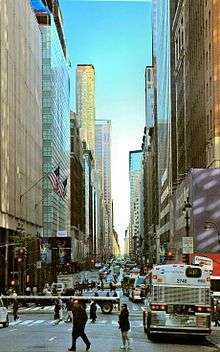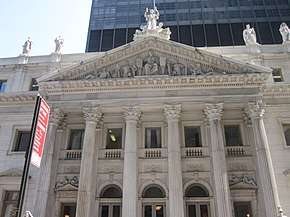Madison Avenue
Madison Avenue is a north-south avenue in the borough of Manhattan in New York City, United States, that carries northbound one-way traffic. It runs from Madison Square (at 23rd Street) to meet the southbound Harlem River Drive at 142nd Street. In doing so, it passes through Midtown, the Upper East Side (including Carnegie Hill), East Harlem, and Harlem. It is named after and arises from Madison Square, which is itself named after James Madison, the fourth President of the United States.
 Looking north from 40th Street | |
| Owner | City of New York |
|---|---|
| Maintained by | NYCDOT |
| Length | 6.0 mi[1] (9.7 km) |
| Location | Manhattan, New York City |
| Postal code | 10010, 10016, 10017, 10022, 10065, 10021, 10075, 10028, 10128, 10029, 10035, 10037 |
| South end | 23rd Street in Flatiron |
| Major junctions | |
| North end | |
| East | Park Avenue |
| West | Fifth Avenue |
| Construction | |
| Commissioned | 1836 |
Madison Avenue was not part of the original Manhattan street grid established in the Commissioners' Plan of 1811, and was carved between Park Avenue (formerly Fourth) and Fifth Avenue in 1836, due to the effort of lawyer and real estate developer Samuel B. Ruggles, who had previously purchased and developed New York's Gramercy Park in 1831, and convinced the authorities to create Lexington Avenue and Irving Place between Fourth Avenue (now Park Avenue South) and Third Avenue in order to service it.
The street's name has been metonymous with the American advertising industry since the 1920s. Thus, the term "Madison Avenue" refers specifically to the agencies and methodology of advertising.[2] "Madison Avenue techniques" refers, according to William Safire, to the "gimmicky, slick use of the communications media to play on emotions."[3]
Route
Madison Avenue carries one-way traffic uptown (northbound) from East 23rd Street to East 135th Street, with the changeover from two-way traffic taking place on January 14, 1966, at which time Fifth Avenue was changed to one-way downtown (southbound).[4] Between East 135th Street and East 142nd Street, Madison Avenue carries southbound traffic only and runs parallel to the Harlem River Drive.
Role in advertising industry
The term "Madison Avenue" is often used metonymically to stand for the American advertising industry. Madison Avenue became identified with advertising after that sector's explosive growth in this area in the 1920s.[5]
According to "The Emergence of Advertising in America", by the year 1861, there were twenty advertising agencies in New York City; and the New York City Association of Advertising Agencies was founded in 1911, predating the establishment of the American Association of Advertising Agencies by several years.[5]
Among various depictions in popular culture, the portion of the advertising industry which centers on Madison Avenue serves as a backdrop for the AMC television drama Mad Men, which focuses on industry activities during the 1960s.[5]
In recent decades, many agencies have left Madison Avenue, with some moving further downtown and others moving west.[6][7] The continued presence of large agencies in the city made New York the third-largest job market per capita in the U.S. in 2016, according to a study by marketing recruitment firm MarketPro.[8] Today, several agencies are still located in the old business cluster on Madison Avenue, including StrawberryFrog, TBWA Worldwide, Organic, Inc., and DDB Worldwide. However, the term is still used to describe the agency business as a whole and large, New York–based agencies in particular.[5]

Madison Square Park and Madison Square Garden
Madison Square Park is a 6.2-acre (2.5-hectare)[9] public park which runs along Madison Avenue from East 26th Street to East 23rd Street. It is bordered on the west by Fifth Avenue and Broadway as they cross. The park was named for James Madison, fourth President of the United States.[10]
Madison Square Garden took its name from the location of the first building of that name, located on the northeast corner of Madison Avenue at 26th Street, across from the Park. The first Garden was a former railroad terminal for the Park Avenue main line, which was converted into an open-air circus venue by P. T. Barnum in 1871 and was renamed "Madison Square Garden" in 1879. (The New York Life Insurance Building now occupies that entire city block.) The original Garden was demolished in 1889 and replaced by a new indoor arena designed by Stanford White that opened the following year. The second Garden had a bronze statue of the Roman goddess Diana on the tower of the sports arena. When it moved to a new building at 50th Street and Eighth Avenue in 1925 it kept its old name. Madison Square Garden is now located at Eighth Avenue between 31st and 33rd Street; however, it still retains the name.
Economy
Retail brands with locations on Madison Avenue include: Burberry, Manrico Cashmere, Brooks Brothers, Alexander McQueen, Hermès, Tom Ford, Céline, Proenza Schouler, Lanvin, Valentino, Stuart Weitzman,[11] Damiani, Emporio Armani, Prada, Chloé, Roberto Cavalli, Davidoff, Dolce & Gabbana, Gucci, Calvin Klein, Cartier, Christian Louboutin, La Perla, Jimmy Choo, Jacadi, Mulberry, Victoria's Secret, Barneys New York, Coach, Rolex, Giorgio Armani, Oliver Peoples, Vera Wang, Anne Fontaine, Baccarat, Carolina Herrera, Ralph Lauren and others.[12]
Transportation
Buses and bus lane
Madison Avenue is served by the M1, M2, M3, M4 and Q32 local New York City Transit buses; the BxM3, BxM4, BxM6, BxM7, BxM8, BxM9, BxM10, BxM11, BxM18, QM21, SIM4C, SIM6, SIM6X, SIM8, SIM8X, SIM22, SIM23, SIM24, SIM25, SIM26, SIM30, SIM31, X63, X64 and X68 express New York City Transit buses; and the BxM4C express Bee Line bus. These buses use a double exclusive bus lane between 42nd and 59th Streets, which comprise the only exclusive bus lane along the avenue.[13]
Although no New York City Subway stations are named after Madison Avenue, the Fifth Avenue/53rd Street station on the E and M trains has an entrance on Madison Avenue.[14]
Pursuant to Section 4-12(m) of the New York City Traffic Rules,[15] driving a vehicle other than a bus in the bus lane on Madison Avenue to turn right during the restricted hours specified by sign between 42nd Street and 59th Street is prohibited, then permitted at 60th Street, but a taxicab carrying a passenger may use the bus lane to turn right at 46th Street. Bikes are excluded from this prohibition.
Overturned midtown bike ban
In July 1987, then-New York City Mayor Edward Koch proposed banning bicycling on Fifth, Park and Madison Avenues during weekdays, but many bicyclists protested and had the ban overturned.[16] When the trial was started on Monday, August 24, 1987 for 90 days to ban bicyclists from these three avenues from 31st Street to 59th Street between 10 a.m. and 4 p.m. on weekdays, mopeds would not be banned.[17]
References
- Google (September 12, 2015). "Madison Avenue" (Map). Google Maps. Google. Retrieved September 12, 2015.
- Martin Mayer, Whatever happened to Madison Avenue?: Advertising in the '90s (Little, Brown, 1991).
- William Safire, Safire's new political dictionary: The definitive guide to the new language of politics (Random House, 1993) p 428
- Kihss, Peter. "5th and Madison Avenues Become One-Way Friday; Change to Come 7 Weeks Ahead of Schedule to Ease Strike Traffic 5th and Madison to Be Made One-Way Friday", The New York Times, January 12, 1966. Accessed December 6, 2007. "The long-argued conversion of Fifth and Madison Avenues to one-way streets will start at 6 A.M. Friday seven weeks ahead of schedule to ease congestion caused by the transit strike."
- "Advertising Ephemera Collection - Database #A0160". Emergence of Advertising On-Line Project. Advertising & Marketing History, John W. Hartman Center for Sales, David M. Rubenstein Rare Book & Manuscript Library, Duke University. 1997. Retrieved October 2, 2012.
- Rothenberg, Randall (February 2, 1989). "Madison Ave. Quits Madison Ave". The New York Times.
- Deborah Leslie, "Abandoning Madison Avenue: the relocation of advertising services in New York City." Urban Geography (1997) 18#7 pp: 568-590.
- "The 10 Hottest Job Markets for Digital Marketing Careers Right Now". August 16, 2016. Retrieved August 17, 2016.
- Event Horizon: Mad. Sq. Art.: Antony Gormley installation guide published by the Madison Square Park Conservancy
- Mendelsohn, Joyce. "Madison Square" in Jackson, Kenneth T., ed. (1995). The Encyclopedia of New York City. New Haven: Yale University Press. pp. 711–712. ISBN 0300055366.
- nycgo.com Christina Parrella, Mad About Shopping: Madison Avenue 09/11/2013
- nyc.com Madison Avenue shopping Archived December 23, 2012, at the Wayback Machine
- "Bus Lanes in New York City" (PDF). nyc.gov. New York City Department of Transportation. Retrieved April 4, 2016.
- "Map of NYC Subway Entrances". NYC Open Data. City of New York. Retrieved July 10, 2018.
- New York City Traffic Rules, New York City Department of Transportation.
- Dunham, Mary Frances. "Bicycle Blueprint – Fifth, Park and Madison" Archived March 4, 2016, at the Wayback Machine, Transportation Alternatives. Accessed April 27, 2009.
- Yee, Marilynn K. "Ban on Bikes Could Bring More Mopeds", The New York Times, Tuesday, August 25, 1987. Accessed April 27, 2009.
External links
